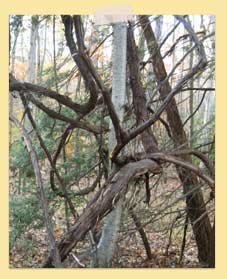Survivor Narrative
Ruth Ann
My story is probably a little different, in that I'm not gay. Nevertheless, I grew up in a conservative Christian church in Northern Ireland. Being Catholic was bad enough, being gay was quite simply not mentioned!!
I went to university, got involved in some student welfare work and discovered that around a third of those involved were gay. So it seemed that many of my closest friends at uni (and now) were (and are) gay.
Being a good Christian girl as I was, I asked my church leaders for advice. Thankfully they were very supportive of my involvement in a group were so many people were gay (which, having since been around other Christian groups, may well be an unusually tolerant attitude), and weren't unduly concerned by my meanderings into gay bars and such like. Nonetheless, I think they believed that my "involvement in the gay community" was some kind of outreach activity, whereupon I might help save a few people from such a terrible lifestyle.
They kindly offered me a plethora of literature recommended by groups such as True Freedom Trust and Exodus International. I lapped it all up, believing that perhaps homosexuality was some kind of blip in sexual development that could be healed - thereby avoiding the difficult question - what if it didn't work, and what if this isn't true, and what if people who are gay are gay to stay!
However, one of my best friends who is also a Christian came out as gay. I recommended True Freedom Trust, but she was adamant (thank God) that she wasn't going near them. When it came to a close friend, I found the story wasn't quite so simple as that.
Unfortunately, I'm also a psychology student, so I was forced to engage more seriously with issues than most church advocates of groups like True Freedom Trust. Both the American Psychological Association and British Psychological Association clearly state that there is no reason to believe that homosexual orientation is an illness, and indeed, that attempting to change one's orientation typically results in damage, depression and suicidality. Upon honest reading, I discovered that homosexuals were no more likely to have been abused as children, come from a disrupted family background as heterosexuals, and to top it all of, homosexuality does seem to have quite a large genetic/biological component.
Still wanting to be a good Christian, I turned to the Bible for guidance, read widely and thought deeply and I discovered that perhaps things were not quite so simple as I had been led to believe.
And as soon as I began to gain some work experience in clinical psychology, I realised that the practices advocated by some sectors of the ex-gay movement were far from orthodox, and had no evidence base on which to justify their use. (Indeed, there is more of an evidence base that would suggest their use is damaging!)
Through searching, a few lively debates with some church leaders I came to the conclusion that I'd been wrong - the Bible didn't condemn homosexuality, it wasn't a disease, trying to change it was likely to be damaging. Ultimately, I came to believe that the only real teaching in the Bible that could reasonably be applied to same-sex (or indeed, any) relationships was Jesus' teaching that we should love one another. So that's what I believe, that Christ is present in every relationship based on mutual love and trust.
Around the same time that I came to these conclusions, Jeffrey John was appointed as Bishop of Reading in England, and quickly resigned due to uproar in the Anglican church that hit international headlines. Everywhere you went, Christian circles were in a twist about gay Bishops and gay marriages!
I realised that in the church circles I moved in, I was probably not going to be welcome to think that being gay was not only ok, but gay relationships had the potential to be beautiful expressions of love. And as for putting into practice my newfound belief in Christ teaches us to celebrate loving relationships, and help those around us to overcome hurtful or damaging relationships...well that was just plain heresy!! (I'm so glad the British church has given up burning people at the stake - if they hadn't, I may well have been on one!)
I realised that my friends in same sex relationships were not going to have those relationships welcomed and supported in the Christian community. I realised that actually, perhaps I wasn't going to be welcome to do those things as a member of the Christian church. Everywhere I turned I met with awkwardness and disapproval.
 So I left. I left the kind of churches I'd grown up in. I went through a long phase of doubting and at times, loneliness as I became cynical about just about everything I'd ever believed! In some ways lost my faith and found that my friendships with many Christian friends were growing distant.
So I left. I left the kind of churches I'd grown up in. I went through a long phase of doubting and at times, loneliness as I became cynical about just about everything I'd ever believed! In some ways lost my faith and found that my friendships with many Christian friends were growing distant.
In that time, I found a considerable refuge in a few of my friends who were gay, particularly my close Christian friend who had come out. As I rather emotionally apologised for advocating True Freedom Trust and not being able to accept her sexuality, she offered me the kind of understanding and forgiveness I needed.
Having felt so alone and as though I had lost my faith, her kindness and the understanding offered to me by several other of my friends who are gay enabled me to accept myself.
Although they probably never realised it at the time, their friendship and understanding towards me was a major factor in my not becoming entirely bitter and cynical. As many of them had found rejection in the conservative church, they'd also explored spirituality in a much more open and relaxed way. They too inspired me to continue on my spiritual search and explore the possibility of faith outside the conservative church.
And since I've found and been welcomed in gay affirming churches and spiritual groups that have welcomed my very honest and at times, painful questionning and through that I'm developing a more thoughtful and open minded faith.
I thought I was going to help gay people find Jesus - perhaps it is ironic, that when my faith was dangling by a thin thread, and the only words I had to say about the church were cynical and even bitter - it was their kindness and acceptance that enabled me to find Christ again and continue in my journey with a new sense of self acceptance, love for others and appreciation of life.
Read other ex-gay survivor narratives.
